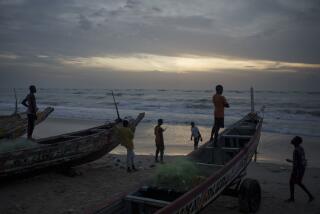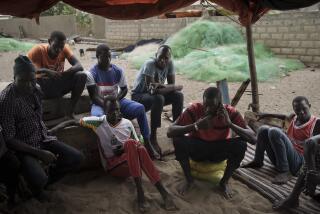Senegal’s Fishermen No Match for EU Trawlers
- Share via
AT SEA OFF JOAL, Senegal — Balanced above his sea canoe’s empty hold, Daouda Wade levels an accusatory finger at four blots on the horizon -- factory-sized foreign vessels fishing in the Atlantic off West Africa.
“Those big boats have caught everything,” the 33-year-old fishing captain says.
The European-flagged ships are working in Senegal’s waters under a four-year, $75-million contract between the European Union and Senegal’s government, which says the agreement brings in a steady stream of sorely needed cash.
“And now there’s nothing left for us, the Africans,” Wade says, his 25 sweat-streaked crewmen squatting idly atop unused nets piled in the bottom of the canoe.
It’s a complaint increasingly heard: that Western boats that have depleted fishing grounds in the North Atlantic now are depleting African waters, leaving little for the locals. The European trawlers -- multi-deck steel ships 20 times the size of Wade’s 100-foot canoe of brightly painted timber -- can land single hauls of fish worth tens of thousands of dollars in Europe.
These days, Senegalese fishermen say, they are earning less than a dollar a day -- if they’re lucky. In a 14-hour day, Wade’s crew didn’t catch a single fish.
Senegalese fishermen, whose practices are little modernized beyond outboard motors and synthetic-fiber nets, say the coastal catch they consider their birthright is disappearing into the trawlers’ refrigerated holds.
The World Wildlife Fund says a decrease in fish stocks off West Africa is linked to European vessels legally fishing, as well as Russian and Asian boats that slip in illegally.
The foreign-flagged vessels are “mainly responsible for overexploiting the fish resources, which ought to be providing food for Africa now and in the future,” the fund said in a 2002 report.
But conservationists say Senegalese fishermen also bear blame, some for keeping small fry rather than throwing them back, others for using dynamite instead of nets and hooks.
“There’s blame enough for everyone,” says Paul Siegel of the World Wildlife Fund in Senegal’s capital, Dakar. “But one thing’s for sure: There are too many fishermen chasing far too few fish.”
The European Union defends its fleet. It says the contract limits the catch of many fish species, installs observers on each boat and provides jobs for Senegalese. Under the four-year contract, extending a pact originally signed in the early 1980s, the EU pays nearly $20 million annually to Senegal, one of the world’s poorest countries.
The pact requires that $3.6 million of the annual proceeds be spent on developing sustainable and responsible fishing methods in Senegalese waters.
“This will contribute to a considerable improvement in the management of the marine resources in Senegalese waters,” Gregor Kreuzhuber, a spokesman for the EU’s agriculture and fisheries commissioner, said in a written response to questions submitted by Associated Press.
“It’s so important for the government to have this money,” Moustapha Thiam, a deputy director of Senegal’s Department of Fisheries, said.
But many people in Senegal’s fishing towns say they see little benefit trickling down from the EU payments.
About 600,000 people in this former French colony of 11 million work in fishing and related industries.
A dry land edging on the Sahara Desert, Senegal produces little beyond peanuts, cotton and cement, so fish have always played a vital role in incomes, diet and culture.
Canoes, wharves and smokehouses dot the 220-mile coastline. Old women clean, scale and sell fish at ever-increasing prices at roadside markets throughout the country.
Spiced fish and rice is the national dish. Flirting teenagers use the name of Senegal’s main catch -- thiof -- as a synonym for “cute” and “handsome.”
In 1997, Senegal’s fishing canoes and foreign trawlers together pulled 453,000 tons of fish from territorial waters, according to government figures. By the end of 2001, the catch had dropped to 396,000 tons. Tuna stocks, considered a benchmark for the sea’s overall health, have almost disappeared, the World Wildlife Fund says.
The people of Joal, a fishing town of concrete-block shacks and crumbling roads, wish the European boats would make like the fish -- and disappear.
Like most retirees in Senegal, Mboye Ndiaye, 63, depends on younger generations to support him in his old age.
“I have no money saved; I only have my family,” he says, staring out at the choppy sea, wistfully recalling the 1960s and ‘70s, when Joal’s waters teemed with tuna, thiof and cod.
“Before, we were tired, but we made money,” he says. “Now we’re just tired.”
More to Read
Sign up for Essential California
The most important California stories and recommendations in your inbox every morning.
You may occasionally receive promotional content from the Los Angeles Times.












